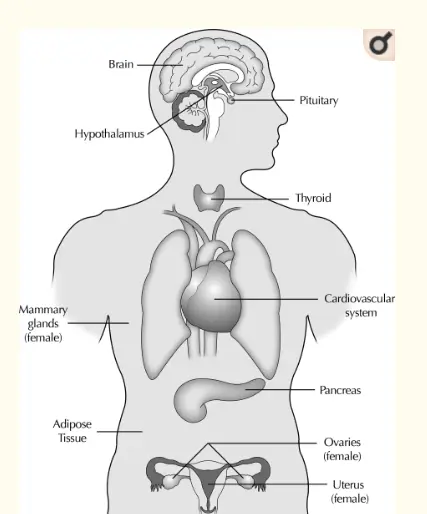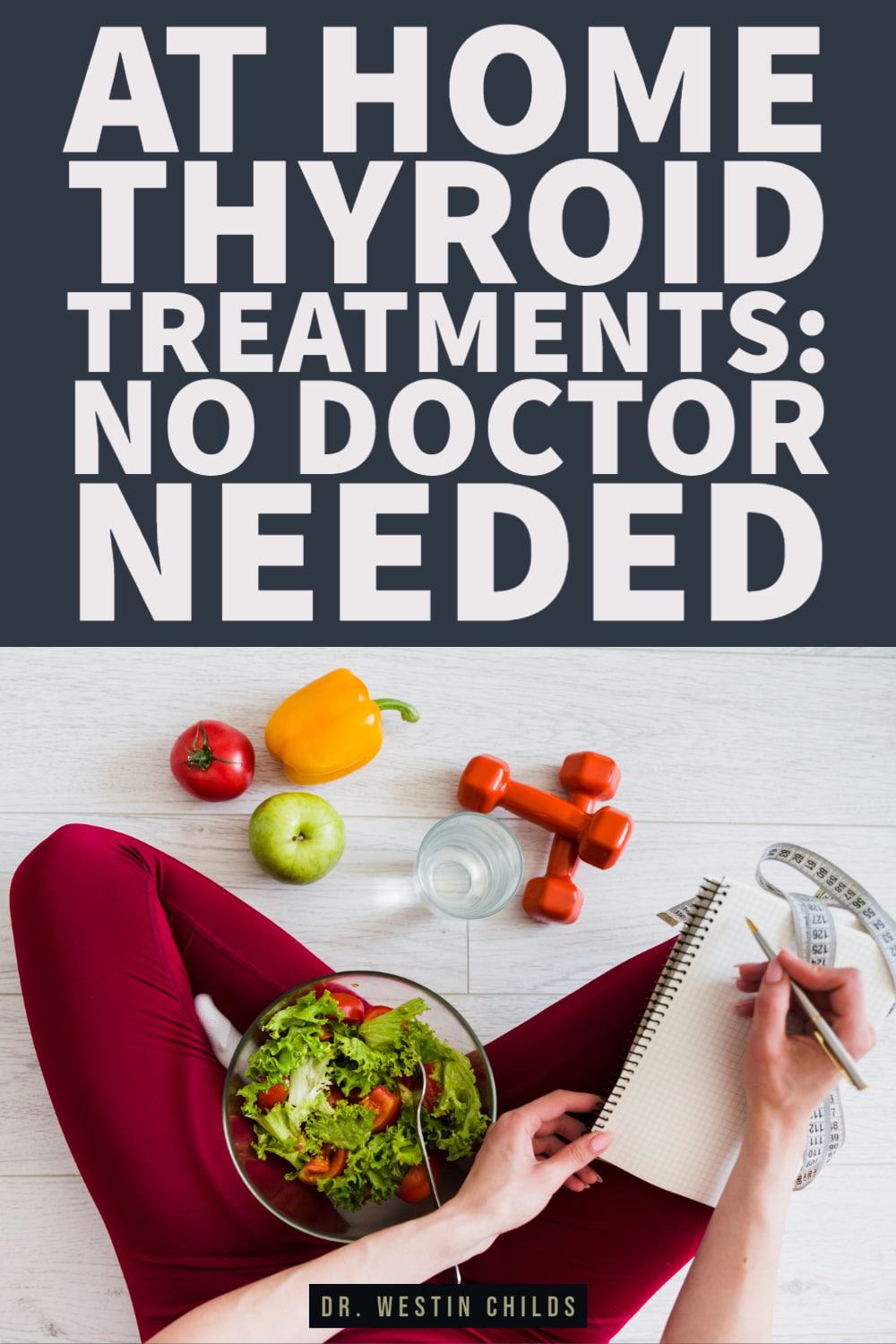One of the most frustrating aspects of having a thyroid problem is getting the right treatment/therapy.
For most people, this includes changing up the medication they are taking to include some combination of T4 + T3 medication.
If you aren’t familiar with this idea and why it is so superior to taking just Synthroid/levothyroxine alone I would recommend that you take a look at this article.
For those of you who know what I’m talking about, you know that it can be VERY difficult to get a standard conventional doctor to work with you on changing up your medication.
You can spend hours and hours reading information (like that I have posted on my blog) and case studies showing how effective these therapies are only to find out that your doctor is simply unwilling to work with you.
Now, obviously, you should spend a lot of time and energy searching for a doctor who is willing to work with you, but is there anything you can do in the meantime?
And the answer to that question is YES.
And that’s exactly what we are going to be discussing today.
8 Therapies You Can Do at Home
It may surprise you to know that there are several things that you can do AT HOME as a thyroid patient that have a significant impact on thyroid function, your immune system, and your weight.
Now, I know what you are probably thinking.
I’ve already tried these things…
And I understand that you think you probably have, but let me just take a second to let you know that even though you have tried them doesn’t mean you did them correctly.
I can’t tell you the number of times I’ve been talking to patients who have said that they do eat healthily or that they exercise or that they do take supplements and so on.
But a deeper dive into their history shows me that while they have dabbled in these areas, they haven’t really done them the right way.
And doing them the right way makes ALL the difference.
Just one quick example before we jump into these areas:
I’ve talked to tons and tons of patients who have tried things like certain supplements only to stop them after experiencing some minor symptoms such as nausea/fatigue when using them.
The sad part about this is that sometimes you do need to feel worse before you feel better.
Many of these patients were on the right track but got off of that track because they were met with a hiccup (such as minor symptoms).
But the presence of these symptoms is not an indication that they were on the wrong track but the exact opposite.
This doesn’t happen all the time, though, so it’s often ideal to have someone help guide you through that process if they are available.
But, if a knowledgeable doctor isn’t available to you there are still things that YOU can do at home.
DOWNLOAD FREE RESOURCES
Foods to Avoid if you Have Thyroid Problems:
I’ve found that these 10 foods cause the most problems for thyroid patients. Learn which foods you should avoid if you have thyroid disease of any type.
The Complete List of Thyroid Lab tests:
The list includes optimal ranges, normal ranges, and the complete list of tests you need to diagnose and manage thyroid disease correctly!
#1. The food you put into your mouth
The first thing we should talk about is your diet.
If you are new to this whole thyroid thing then you may not be aware of just how much of an impact certain foods have on your thyroid.
This effect is so profound that I’ve spent tens of thousands of words talking about it in detail in previous articles and posts.
I’m not going to rehash the same information I’ve put there but I will provide you with links to that information and I would recommend you read through them if you haven’t already:
- The Perfect Thyroid Diet
- 10 foods to avoid if you have thyroid problems
- Hashimoto’s Diet Guide
- Is the ketogenic diet safe if you have thyroid problems?
- Hypothyroidism diet guide
- Are goitrogenic foods dangerous?
- Why I recommend all thyroid patients try going gluten-free
- 6 Healthy habits that may be hurting your thyroid
How does your diet impact your thyroid health (and overall health, for that matter)?
There are many reasons, but perhaps two of the most important include its ability to provide you with micronutrients and vitamins/minerals AND its ability to influence your gut (1).
The micronutrients and vitamins aspect should make a lot of sense.
You consume food because it contains information in the form of vitamins and nutrients which your body uses in each and every cell.
If you don’t consume real whole foods that are dense with these nutrients then you will eventually develop nutrient deficiencies.
This exact mechanism occurs in vegan diets due to the low content of B12 in vegan foods.
Nutrient deficiencies, even in small amounts, can then set you up to develop inflammation, hormone imbalances, and so on.
The second most important reason to consume a healthy diet is because of the influence that it has on your gut.
As a thyroid patient, this is incredibly important because your gut is the site of about 20% conversion of T4 to T3.
In other words, if you have any issues in your gut (whether you realize them or not), they could be contributing to decreased T3 levels in your body.
That’s a sobering thought when you realize that T3 is responsible for all of the heavy lifting that your thyroid does at the cellular level.
So, the bottom line?
If you haven’t already you should be cleaning up your diet and trying the various diets listed in my articles above.
They can and do impact your overall health and thyroid function.
What if you don’t feel better as you change your diet?
Even if you don’t seem to get any noticeable improvement with your diet you should STILL eat healthily.
Eating healthy will make the other therapies we are going to discuss even more effective.
#2. Some medications
Typically we think of prescription medications as only being available with a prescription from a doctor.
And that’s certainly how it is in the United States.
But this isn’t true in all countries.
In fact, there are many countries around the world where you can walk up to a pharmacy and simply purchase the medication that you need (and often the price is MUCH cheaper than what is charged in the United States).

This is both a blessing and a curse for some thyroid patients.
I’m not endorsing the idea of using prescription medications without a doctor (that has the potential to be dangerous and I could get in trouble for suggesting it), but I want you to be aware that this option does exist and may be considered in extreme cases.
There are some thyroid patients who obtain prescription medications from overseas pharmacies to complement whatever therapies they are currently using with their doctor.
Again, this can be dangerous and I have seen numerous patients accidentally overdose on thyroid medication (especially T3) while doing this.
But I want you to be aware that it is a potential option.
I also know of some patients who utilize this approach to help reduce the cost of some medications, especially those that are astronomical in price here in the United States.
This approach can be very effective for some of the GLP-1 agonists (such as Saxenda) which are thousands of dollars here in the US and a couple hundred in other countries.
#3. Supplements protocols and routines
I can’t recall a single patient that I’ve treated in the past who didn’t benefit from the use of dietary supplements in some form.
I would extend this to say that probably most people (even healthy people) should be supplementing with things like probiotics, fish oil, vitamin D, protein powder, and a standard multivitamin.
Supplements are powerful because they allow you to augment the other therapies you are already using, provide your body with more of the nutrients it needs to function optimally and fine-tune certain functions and pathways that can help your thyroid work better.
Perhaps the most attractive aspect of using supplements is the fact that they are available over the counter.
This means that you can learn about supplements, find out what your body needs, and go out and buy them yourself.
Before you do that, though, let’s talk about how to actually use these supplements appropriately.
There are hundreds and hundreds of supplements with various nutrients, concentrations, vitamins, and herbs.
Each of these supplements does something different and to make matters worse, there is certainly some overlap between various supplements.
We can pare down that list tremendously by hyper-focusing on thyroid function.
If you have thyroid problems, it doesn’t matter what type, then this approach makes sense.
You can easily eliminate 90% of these supplements and focus on what your body and thyroid actually need.

But how do you use supplements for your thyroid?
My recommendation is to take a multi-faceted approach and target thyroid function from different angles.
One angle would be your gut health (we talked about this previously), another would be adrenal health, another would be direct thyroid function, another would be immune function, and another would be weight loss.
You can take different protocols and regimens to target these specific areas and impact your thyroid either directly or indirectly.
A simplified gut health protocol might look something like this:
- 2 capsules of Thyro Biotic taken daily which provides your gut with 3 different types of beneficial probiotic species including soil-based organisms, lacto and bifido strains, and beneficial yeast.
*Probiotics can help improve thyroid function indirectly by improving T4 to T3 conversion in the gut.
A simplified adrenal protocol might look something like this:
- 2 capsules of Thyroid Adrenal Reset Complex to support both adrenal and thyroid function simultaneously
- 2 capsules of Thyroid Glandular+ which provides your body with thyroid, adrenal, pituitary, thymus, and spleen glandulars.
*Adrenal adaptogens and adrenal glandulars help improve cortisol, adrenal function, and even thyroid function.
A simplified thyroid support protocol might look something like this:
- 2 Capsules of Thyroid Adrenal Reset Complex daily
- 2 capsules of T3 Conversion booster daily – to support healthy T3 levels.
- 1 scoop of Thyro Fuel daily – to act as a daily protein powder with additional thyroid support nutrients
*Support T4 to T3 conversion, thyroid cellular activity, and thyroid hormone production.
I’ve listed some of my own products because these are the ones that I’m familiar with and I know that they work.
But you can use whatever products you want as long as you can find similar ingredient profiles.
I happen to believe that my thyroid products are the best out there but I will freely admit that others work as well.
As a thyroid patient, you can use ANY of these protocols because of how they all interact with your thyroid.
Yes, some might be better than others for each individual, but they will all have some positive impact if they are used consistently and for a long enough time period.
When it comes to supporting your thyroid, plan to take your supplements daily for at least 6-8 weeks before expecting any improvement.
The thyroid can sometimes be slow to respond to both medications and supplements because of how thyroid hormone impacts cellular function.
This is normal and is not a cause for alarm! Just give it time and stay consistent.
#4. Exercise (Low intensity and high intensity)
I’m only briefly going to focus on exercise here because many of you are probably well aware of exercise (I would be surprised if your current doctor didn’t recommend this already).
The main point here is that you should focus on the right type and duration of exercise based on your body and thyroid function.
Exercise means a lot of different things to different people and you don’t need to push yourself to the extreme to get some benefit out of it.
Even small amounts of activity, such as walking daily, can have a big impact on your health and thyroid function.
Again, I’ve seen a number of people who simply push the button too hard on exercise and end up causing more harm than good when they do.
Exercise, defined as an activity that puts stress on your body and heart rate, does cause an increase in cortisol.
And this increase in cortisol can be both good and bad.
Good if your body can tolerate it and bad if it cannot.
Finding balance is the key here.
You can learn how to do that and which exercises I recommend in the links below:
- Exercises that improve and stimulate thyroid function
- Is it safe to exercise if you have thyroid problems?
Even if you feel like you can’t add any form of exercise to your routine because of fatigue just get started with something.
Walking, running errands, stretching, etc. can still be helpful for your thyroid and will slowly add up over time.
The more you move and the more you exercise the stronger you will feel.
Don’t neglect this step!
#5. At-Home Thyroid Testing
There are a handful of companies that provide you with the ability to test your own hormones at home.
I actually recently tested a finger-prick thyroid lab test at home on my wife and will be writing about this experience soon.
Why does it matter if you can test yourself at home?
Well, if you have the time there is enough information posted on my website for you to have a fairly good understanding of what you want your thyroid lab tests to look like.
Let’s imagine a scenario:
What if you were unable to get your doctor to work with you and he/she was even unwilling to order the right thyroid lab tests?
You could theoretically get these lab tests done on your own and monitor your progress (as you follow the therapies listed here) to determine if you are on the right track.
In a sense, you would be focusing on more natural therapies and doing the same thing that your doctor does currently (making changes based on your lab tests).
Do I recommend that you do this?
Not unless it is your only option.
I will ALWAYS recommend that you try to work with a knowledgeable doctor because I know how effective that can be.
In addition, it’s always better to get your INSURANCE to pay for your thyroid lab tests (if possible).
One of the main downsides to at-home testing is that insurance doesn’t typically cover it and it can be expensive.
If you are already paying for insurance then it makes sense to take advantage of that to get your insurance to pay for your thyroid lab tests.
But, if for any reason your insurance won’t or you can’t get these tests, then getting your own tests makes sense.
I have a number of people that I do secondary consults to evaluate their lab work who get their lab work from these third-party places so I know that there must be a large number of people in this situation.
#6. Stretching & Yoga
We tend to put yoga and stretching into the exercise category and I think that’s a mistake.
Stretching and yoga, while they do help improve blood flow, also have additional benefits (2).
They help improve your flexibility, blood flow to organs/tissues, balance, soft tissue, and blood flow to your muscles, reduce stress, and release endorphins which can improve immune function.
I find that these two are so important that I do them every night (even if I can’t do a full stretch or yoga routine I still try to do at least 5 minutes).
I would say that there is definitely a mismatch between the huge benefit that stretching/yoga provides and the scientific literature.
Meaning I can’t point to a study to “prove” that it’s as effective as I say but it’s something that you don’t have to trust me on.
Go and test it for yourself.
Do a quick 10-15 minute yoga session before bed (or right when you wake up).
Focus on stretches that open up your hip flexors, your abdomen/core, your chest, and the front of your neck.
I can almost guarantee that you will feel amazing.
You’ll be able to breathe better, your posture will improve, and you will have more focus.
You might also get the added benefit of reduced back pain (if you have it) and reduced headaches (if you suffer from them).
Here’s a simple stretching routine that you can do at home:
This isn’t the exact stretching routine that I follow but it’s good enough to start with if you’ve never tried it.
#7. Detoxification + FAR IR Sauna
Lastly, you can and should make efforts to reduce your exposure to certain chemicals.
You might believe that these things have a significant impact on your thyroid health but you would be wrong.
While it is true that these compounds do not affect all thyroid patients equally, I still think it’s important to avoid exposure to them as much as possible.
What I’m really talking about is exposure to chemicals found in processed foods, xeno-estrogens found in dairy (3), halides found in soft drinks and soda (4) (bromide), and other endocrine-disrupting chemicals (5).

These chemicals interfere with thyroid function by confusing your body and sitting on your thyroid/estrogen receptors.
The net effect is that they not only disrupt thyroid hormones in your body but they also make your thyroid lab tests inaccurate.
They make it look like your TSH is normal but they can lower your free T3.
If your doctor isn’t checking your free T3 then you may be missing their impact on your thyroid.
You can eliminate them by simply avoiding them, to begin with, but you can also help eliminate them from your body with other therapies.
Some of those therapies include:
- Far IR sauna weekly (20-30 minutes)
- The use of Curcumin + milk thistle + MSM
- The use of Calcium d-glucarate
- The use of DIM
- The use of Vitamin C powder
These supplements all help your liver eliminate these chemicals from your body by helping to break them down.
Final Thoughts
I know it can be frustrating as a thyroid patient, especially when you just want to feel your best.
If you are feeling this way be sure to check out all of these therapies and make sure you also take a deeper dive into the links provided above.
They will give you a great starting point and a good baseline level of knowledge to work with.
Even though these therapies can work in conjunction with medications, I still encourage you to try and find a knowledgeable doctor.
You can use the tips and tricks found in this article to help with just that.
Now I want to hear from you:
Have you tried any of these therapies before?
Did they work for you?
Do you have any other suggestions for thyroid patients that aren’t listed here?
Are you having trouble finding a doctor to work with you?
Leave your questions or comments below!
Scientific References
#1. https://www.ncbi.nlm.nih.gov/pmc/articles/PMC6950569/
#2. https://www.ncbi.nlm.nih.gov/pmc/articles/PMC3193654/
#3. https://www.ncbi.nlm.nih.gov/pmc/articles/PMC4524299/
#4. https://www.ncbi.nlm.nih.gov/pubmed/9140329
#5. https://www.ncbi.nlm.nih.gov/pmc/articles/PMC2726844/








